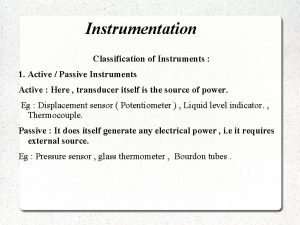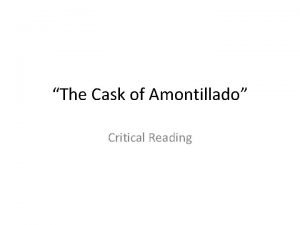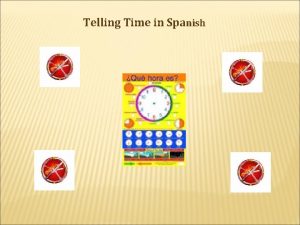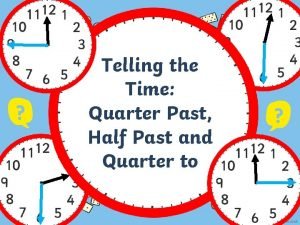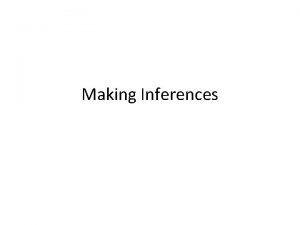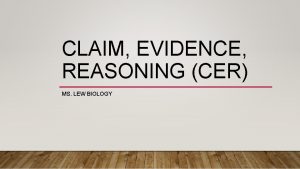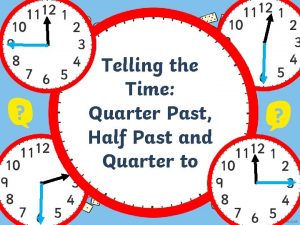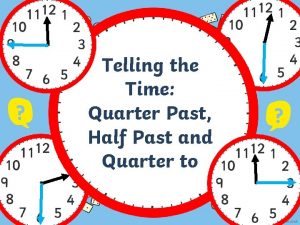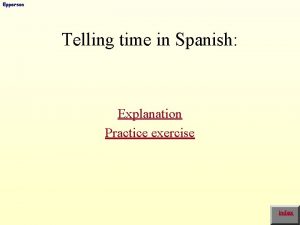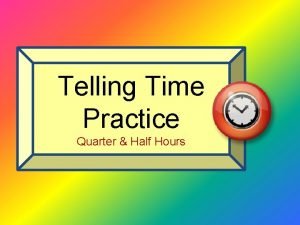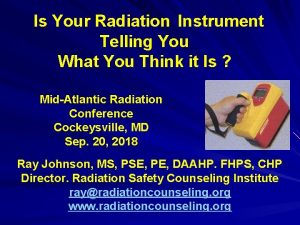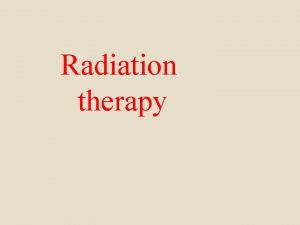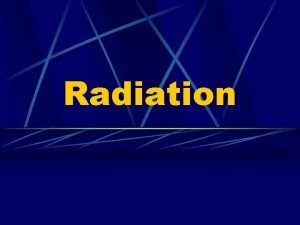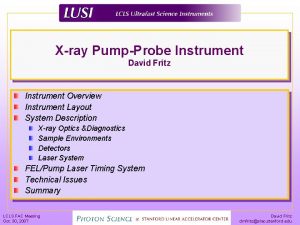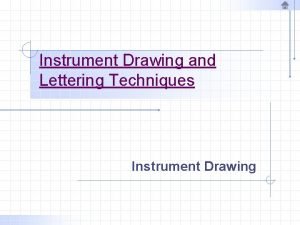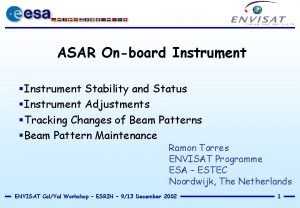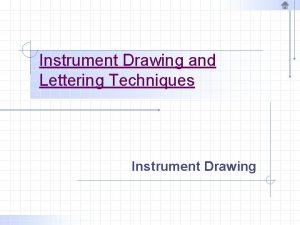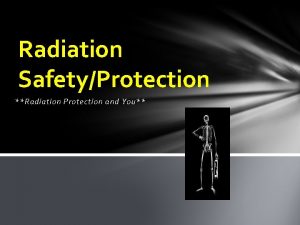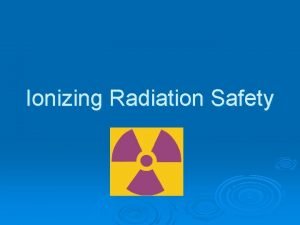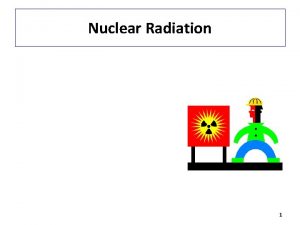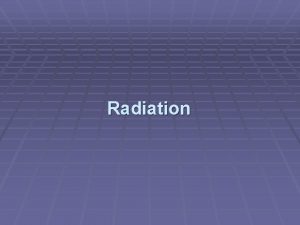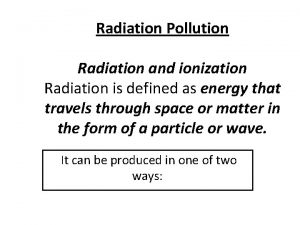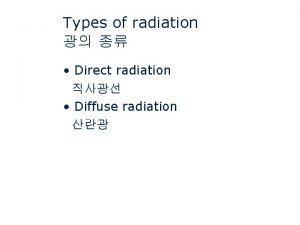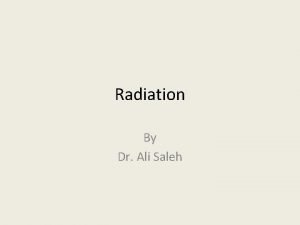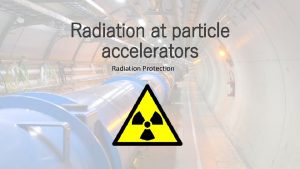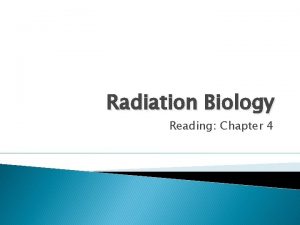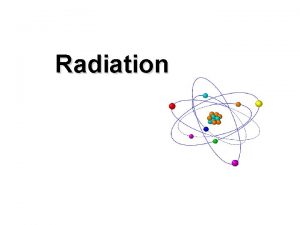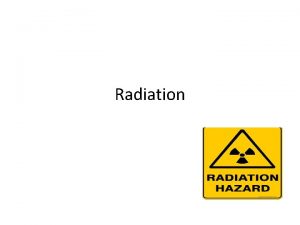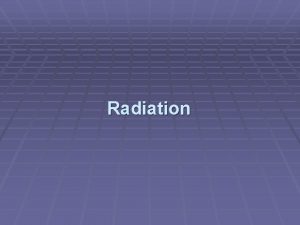Is Your Radiation Instrument Telling You What You































- Slides: 31

Is Your Radiation Instrument Telling You What You Think it Is ? Mid-Atlantic Radiation Conference Cockeysville, MD Sep. 20, 2018 Ray Johnson, MS, PSE, PE, DAAHP. FHPS, CHP Director. Radiation Safety Counseling Institute ray@radiationcounseling. org www. radiationcounseling. org

Good Decisions for Radiation Safety Since our body gives no signal for radiation, we have to rely upon good measurements to tell us the type and amount of radiation Big question ? – Is your instrument telling you what you think it is ? – What can go wrong ? – How good do the data need to be ? 2 Radiation Safety Counseling Institute

My Dismay about Measurements – My work involves providing counseling and training on radiation safety at facilities where they have not had such training before Workers are concerned for exposures to radiation, and have had no training They buy a radiation detector and 1) Proceed to take measurements with the wrong instrument, 2) in the wrong places, and then 3) misinterpret the data Radiation Safety Counseling Institute 3

Psychology of Radiation Measurements Interpretation may have as much to do with attitudes and perceptions as it does with technology Same measurements may have different meanings for others Examples: – Technician at nuclear plant, “We got a hot one here!” – Industrial worker saw GM meter go off scale – Granite counter tops – Firemen observing twice background – Screaming GM meter Radiation Safety Counseling Institute 4

Common Aspect of Scenarios “If its measurable, it must be bad !” Interpretation of measurements is often a matter of responding to fears One person’s answer for defending conservative decision, Precautionary Principle, “Why take chances ? ” “Better to be safe than sorry” Common mindset Measurement = “Deadly Radiation” Risks of NOT taking action – Fears, criticism, responsibilities – Making a mistake Radiation Safety Counseling Institute 5

Measurements are Just Numbers Measurements have no meaning until they are interpreted Measurements only have a meaning in terms of how they are interpreted The meaning is whatever people believe – Often related to fears of radiation – All measurements have uncertainty Radiation Safety Counseling Institute 6

Dealing with Uncertainty Most people do not want to deal with uncertainty, they want absolute values They typically do not ask questions to evaluate the quality of the data or to determine if the data are defensible Tendency is to assume all data are of high quality and suitable for making decisions – When the number is written down, it becomes reliable Radiation Safety Counseling Institute 7

Once Numbers are Written Down by Someone Else Written numbers are considered reliable We are asked to interpret the data without any idea if the numbers are valid Measurements may have great uncertainties, – either unknown or neglected How do we know if the data justify an expensive decision ? Radiation Safety Counseling Institute 8

Written Measurements Take on a life of their own They are treated as gospel Interpreted as absolute values, as if the numbers are real All uncertainties are lost May not ask questions about uncertainties – Especially, if the numbers are above an action level Radiation Safety Counseling Institute 9

Steps for Defensible Measurements 1. Deciding what to measure ? Exposure or contamination ? 2. Choosing the proper instrument 3. Verifying instrument performance 4. Using the instrument properly - According to calibration ? If you have been careful with above steps, – There are still countless pitfalls – You now have measurements to interpret Radiation Safety Counseling Institute 10

Choosing Right Instrument ? What is your need for data? Exposure or activity measurements? What decisions do you want to make? You may have to rely on available meter Could be marginal or totally inadequate 11 Radiation Safety Counseling Institute

Verifying Instrument Operation How do you know if your instrument is working properly ? Battery check ? Check source response ? Appropriate source ? Possible probe or cable failure ? 12 Radiation Safety Counseling Institute

Proper Instrument Usage Calibration conditions – All measurements are made by comparison, i. e. calibration – Reproduce calibration conditions for best quality measurements Geometry conditions, relation of source to detector 13 – How was meter calibrated ? Radiation Safety Counseling Institute

More than 20 Sources of Errors 1. 2. 3. 4. 5. 6. 7. 8. 9. 10. Ion chambers, slow and erratic GM detectors, window and thickness Na. I detectors, very energy dependent Calibration conditions, Cesium - 137 Energy dependence, reference to Cs-137 Signal absorption, scattering Wrong detector or probe, m. R/Hr vs cpm Geometry, relationship to the source Speed of probe movement Operator fatigue and judgment Radiation Safety Counseling Institute 14

Energy Dependence Na. I vs Plastic Scintillator Response Na. I Plastic Radiation Safety Counseling Institute 15

Pan GM with Filter Radiation Safety Counseling Institute 16

Pressurized Ion Chamber Response 17 Radiation Safety Counseling Institute

More Factors Affecting Uncertainty in Radiation Measurements Radiation is random Reading wrong scale Variation in standards Wrong multiplier Sensitivity of instruments Uniformity of samples Counting time Amount of radiation Background and variations Radiation Safety Counseling Institute Sample location Sample selection bias Sample preparation Volume and weight errors 18

Uncertainties not Included Calibration error, typically +/- 10% Energy dependence, factors of 2 - 100 Operator judgements – Right instrument or probe – Use according to calibration – Geometry – Speed of probe – Thoroughness of coverage – Location of measurement Radiation Safety Counseling Institute 19

Other Errors Measuring in contact with the source – Without considering location of people and occupancy time Measurements for gamma without considering the accompanying beta – Exposure in m. R / hr not defined for beta Switch setting may be a multiplier or full scale Digital confusion of m. R / hr vs m. R / hr Radiation Safety Counseling Institute 20

Questions for Interpretation ? What do the numbers mean ? Are the measurements defensible ? What decision do you want to make ? How much resources are you willing to commit on the basis of these measurements ? What is the risk of making a mistake ? – What if you act or do not act ? – How will you be held accountable ? – Possible litigation ? – Upset workers ? Union ? Management ? Radiation Safety Counseling Institute 21

Because of Radiation Fears When a number is above an action level – Many will want to quickly implement safety decisions – Without confirming the measurements “Golden Rule” – Repeat measurements to confirm – Ideally, with different instruments and people – Ask lots of questions Radiation Safety Counseling Institute 22

Uncertainty in Measurements Radiation is statistically random Decay constant – λ = 0. 693 / T 1/2 – probability per unit of time that a decay will occur There are no absolute measurements of radiation No measurement is a single value All are “best estimates” What is the best quality standard available from NIST ? – Since all measurements are made by comparison, we can never be better than the standard Radiation Safety Counseling Institute 23

Quality for Portable Instruments Rule-of-thumb, + / - 20 % Calibrations may be within + / - 10 % NIST standard may be within + / - 5 % Allowance for uncertainty affected by: – Choosing right instrument ? – Is it working properly ? – Is it used properly ? – How does instrument respond ? 24 Radiation Safety Counseling Institute

Reporting Conventions 4. 0 p. Ci / l (no indicator of uncertainty) 4. 0 ± 0. 5 p. Ci / l (uncertainty as std. dev. ) 4. 0 p. Ci / l ± 12% 25 (uncertainty as CV) Radiation Safety Counseling Institute

Significant Figures ? p. Ci / l CV - % 4 25% 4. 0 2. 5% 4. 4 2. 3 % 11 10 % 11. 1 1% 100 1 102 111 135 1 102 Radiation Safety Counseling Institute 26

Defending Results Ask lots of questions How do you know if the data are any good ? Right instrument, working properly, used properly, calibration, energy dependence, geometry ? Report results with estimates of all sources of uncertainty, – Be careful of significant figures Always repeat for confirmation, – Before reporting or making expensive decisions Radiation Safety Counseling Institute 27

Summary Measurements when written down are interpreted as absolute values Interpretation is whatever people believe Over 20 sources of uncertainty – Usually unknown or neglected Randomness means all measurements are only “best estimates” Measurements may lead to fears, which then drive the interpretation Radiation Safety Counseling Institute 28

Summary Common assumptions – If its measurable - it must be bad – Written data are always good – Must take immediate action Common to make decisions (cry wolf) – Without verifying the measurement Stay calm As minimum – repeat at least once – For confirmation, ideally with other instruments and people, if possible Radiation Safety Counseling Institute 29

Summary What do the numbers mean ? Measurements only have meaning in terms of interpretation Data interpretation may be driven by fears – – – Of radiation Of consequences, health risks, Of making a mistake liabilities Is your interpretation defensible ? What are you willing to commit ? Is your meter telling you what you think it is ? Radiation Safety Counseling Institute 30

Questions ? www. radiationcounselng. org ray@radiationcouseling. org 301 -774 -6867 Radiation Safety Counseling Institute 31
 Passive and active instruments
Passive and active instruments 3 clever things montresor does to lure fortunato
3 clever things montresor does to lure fortunato You put your right foot in
You put your right foot in Give us your hungry your tired your poor
Give us your hungry your tired your poor Do you love rain
Do you love rain Time in spanish
Time in spanish Telling sentences
Telling sentences Telling details
Telling details Telling sentence
Telling sentence Story telling poem
Story telling poem Human interest story
Human interest story My intuition is telling me
My intuition is telling me Why is charlie telling hashim jokes?
Why is charlie telling hashim jokes? Telling time and date
Telling time and date Quarter and half
Quarter and half The woman waited nervously in line
The woman waited nervously in line Queenie slip or trip
Queenie slip or trip Telling time in spanish chart
Telling time in spanish chart Time in quarters
Time in quarters Telling the time quarter past
Telling the time quarter past Grade 7 short story unit
Grade 7 short story unit Telling time in hawaiian
Telling time in hawaiian Settings in beowulf
Settings in beowulf Beowulf a new telling
Beowulf a new telling What is tattling
What is tattling Quater past
Quater past Music that tells a story without words
Music that tells a story without words Telling time in spanish practice
Telling time in spanish practice Situational leadership
Situational leadership Telling time notes
Telling time notes Telling time notes
Telling time notes Whats a quarter past 7
Whats a quarter past 7
